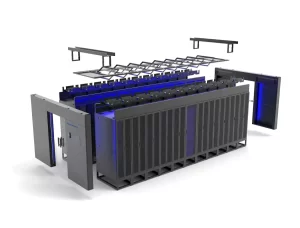Modular Data Centers (MDCs) are a relatively new approach to data center construction that has gained popularity in recent years. Unlike traditional data centers, which are built on-site from scratch, MDCs are built in a factory and then shipped to their final location.
What are Modular Data Centers?
Modular data centers are a type of data center that is built in a factory and shipped to its final location. The modules are typically constructed in standard sizes, such as 20-foot or 40-foot shipping containers, and can be configured in various ways to meet the specific needs of the organization. Once the modules arrive on-site, they are connected together to create a complete data center.

Scalability
One of the biggest advantages of modular data centers is their scalability. Traditional data centers are typically built to accommodate a specific amount of IT equipment, and adding more capacity requires building new facilities or expanding existing ones. With modular data centers, new modules can be added as needed, making it easier to scale up or down depending on the organization's needs.
Cost
Modular data centers can also be more cost-effective than traditional data centers. Since the modules are built in a factory, they can be constructed more efficiently and with less waste. Additionally, the cost of labor is often lower since the modules can be assembled quickly on-site, and there is no need for complex construction work. This can result in significant cost savings for organizations looking to build a new data center.
Speed of Deployment
Another benefit of modular data centers is their speed of deployment. Since the modules are built in a factory and shipped to the final location, the overall construction time can be significantly reduced. This can be especially beneficial for organizations that need to quickly deploy new IT infrastructure or respond to changes in demand.
Flexibility
Modular data centers can also offer more flexibility than traditional data centers. Since the modules can be configured in different ways, organizations can choose the specific modules they need to meet their unique requirements. This can help to avoid wasted space and resources in traditional data centers, where entire rooms or floors may need to be dedicated to specific functions.
Reliability
While modular data centers offer many benefits, they do have some potential drawbacks. One concern is the reliability of the modules themselves. Since the modules are constructed in a factory, there is a risk that they may not be built to the same standards as traditional data centers. Additionally, since the modules are shipped to the final location, there is a risk of damage during transportation that could impact the reliability of the data center.
Security
Another concern with modular data centers is security. Since the modules are designed to be portable, they may not be as secure as traditional data centers. While security measures can be added to the modules themselves, organizations may need to take additional steps to secure the modules during transportation or once they arrive at the final location.
